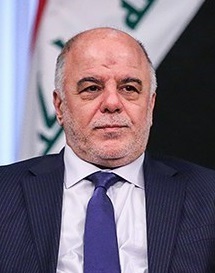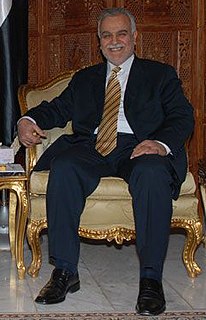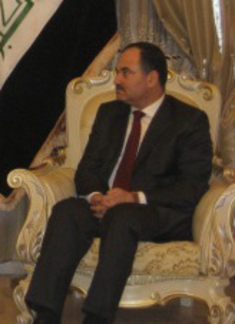Related Research Articles

Tariq Aziz was Iraqi Deputy Prime Minister (1979–2003) and Foreign Minister (1983–1991) and a close advisor of President Saddam Hussein. Their association began in the 1950s when both were activists for the then-banned Arab Socialist Ba'ath Party. He was both an Arab nationalist and an ethnic Assyrian and a member of the Chaldean Catholic Church.

The prime minister of Iraq is the head of government of Iraq.

Haider Jawad Kadhim al-Abadi is an Iraqi politician who was Prime Minister of Iraq from September 2014 until October 2018. Previously he served as Minister of Communication from 2003 to 2004, in the first government after Saddam Hussein was deposed.
Trial in absentia is a criminal proceeding in a court of law in which the person who is subject to it is not physically present at those proceedings. In absentia is Latin for "in (the) absence". Its meaning varies by jurisdiction and legal system.

Saadoun al-Dulaimi is an Iraqi politician, a current MP, ex-minister of culture, and ex-minister of defence of Iraq for two terms.
The first government of Iraq led by Nouri al-Maliki took office on May 20, 2006 following approval by the members of the Iraqi National Assembly. This followed the general election in December 2005. The government succeeded the Iraqi Transitional Government which had continued in office in a caretaker capacity until the new government was formed and confirmed.

Tariq al-Hashimi is an Iraqi politician who served as the general secretary of the Iraqi Islamic Party (IIP) until May 2009. He served as the Vice President of Iraq from 2006 to 2012. As a Sunni, he took the place of fellow Sunni politician Ghazi al-Yawar.

Nouri Kamil Muhammad-Hasan al-Maliki, also known as Jawad al-Maliki or Abu Esraa, is secretary-general of the Islamic Dawa Party and was the Prime Minister of Iraq from 2006 to 2014 and a Vice President of Iraq from 2016 to 2018. Al-Maliki began his political career as a Shia dissident under Saddam Hussein's regime in the late 1970s and rose to prominence after he fled a death sentence into exile for 24 years. During his time abroad, he became a senior leader of the Islamic Dawa Party, coordinated the activities of anti-Saddam guerrillas and built relationships with Iranian and Syrian officials whose help he sought in overthrowing Saddam. Al-Maliki worked closely with United States and coalition forces in Iraq following their departure by the end of 2011.

Osama Abdul Aziz al-Nujaifi or Najifi is an Iraqi politician and served as one of the three Vice Presidents of the country, from 2016 to 2018. As the Speaker of the Council of Representatives, the informal leader of the moderate Sunni al-Hadba party was the highest ranking Sunni politician of Iraq.

The Ministry of Defence is the Iraqi government agency responsible for defence of Iraq. It is also involved with internal security.

Rafi Hiyad al-Issawi is an Iraqi politician who is a former finance minister and deputy prime minister. A doctor by profession, he is the fourth most senior politician from the Sunni Arab minority after former Vice President Tariq al-Hashemi, Deputy Prime Minister Saleh al-Mutlak and Speaker of the Iraqi Parliament, Usama al-Nujayfi.

Safa al-Din Mohammed al-Safi is an Iraqi politician and former Justice Minister who is currently Minister of State for the Council of Representatives.

The Ministry of Trade of Iraq is a conglomeration of state-owned enterprises and operates a nearly $6bn annual budget that provides a monthly public food distribution programme for Iraqis. It also manages the import of grain, seeds and construction materials.
The December 2009 Baghdad bombings were attacks in Baghdad, Iraq, which resulted in the deaths of at least 127 people and injuries to at least 448 more. The attacks have been condemned internationally as acts of terrorism. Opposition parties within Iraqi politics have suggested that the attacks were aided by corruption within the Iraqi security forces and that the Iraqi Prime Minister, Nouri al-Maliki, was incompetent in managing the incident.

The 2011 Iraqi protests came in the wake of the Tunisian revolution and 2011 Egyptian revolution. They resulted in at least 45 deaths, including at least 29 on 25 February 2011, the "Day of Rage".
On 22 December 2011, a series of coordinated attacks occurred in Baghdad, Iraq, killing 69 people. This was the first major attack following U.S. withdrawal from Iraq.
Raad Shallal al-Ani is an Iraqi politician who was Electricity Minister from February to August 2011.

Mohammed Shia' Sabbar al-Sudani is an Iraqi politician was the Human Rights Minister of Iraq in the Council of Ministers of Prime Minister Nouri al-Maliki from 2010 until October 2014. He was the Governor of Maysan Province between 2009 and 2010.

On December 14, 2008, Iraqi journalist Muntadhar al-Zaidi threw both of his shoes at United States President George W. Bush during an Iraqi press conference. Bush quickly ducked, avoiding being hit by either of the shoes. The second shoe hit the US flag, and Al-Zaidi was subsequently grabbed, kicked, and hurried out of the room by guards. Effigies of many United States Presidents had long appeared with shoes on them all over the Middle East, but it was not until this event that shoeing had received widespread notability. Since then, there have been many other shoeing incidents on an international scale. Al-Zaidi received a three-year prison sentence, which was reduced to two years. On September 15, 2009, after nine months of incarceration, he was released early because he had no prior criminal record.
Malas Mohammad Abdulkarim al-Husseini al-Kasnazani is an Iraqi politician who was the Trade Minister from September 2014 until December 2015 under Prime Minister Haider al-Abadi.
References
- ↑ Ministers of Iraq, Middle East Reference
- ↑ Iraqi fury at Australian shooting, The Age , 2006-06-22, accessed on 2009-05-09
- ↑ Iraq issues warrants for trade chiefs over corruption, Reuters , 2009-05-03
- ↑ Gunfight Breaks Out as Iraqi Soldiers Try to Arrest Trade Officials, The New York Times , 2009-05-02
- 1 2 Iraq trade minister quits amid corruption allegations, Bloomberg L.P. via Sydney Morning Herald , 2009-05-26
- ↑ Iraq to arrest 1,000 'corrupt' officials, BBC , 2009-05-27
- ↑ "Dramatic plane arrest of ex-Iraq minister". BBC. 30 May 2009. Retrieved 2009-05-30.
- ↑ Iraq ex-trade minister freed on bail after graft grilling, Zawya , 2009-06-07
- ↑ "Iraqi former trade minister gets 7 years in absentia - Xinhua | English.news.cn". news.xinhuanet.com. Retrieved 2015-08-22.
- ↑ "Iraq receives ex-trade minister convicted on graft charges from Lebano". Reuters. 26 January 2018. Retrieved 2018-02-12.
- ↑ "Iraq sentences ex-minister to 21 years for corruption". The New Indian Express. Retrieved 2018-06-18.